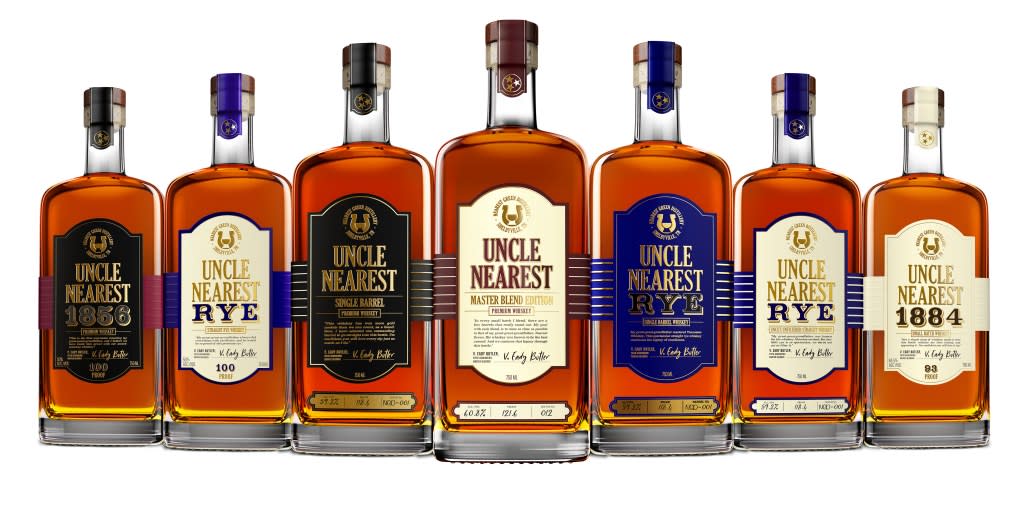Uncle Nearest, the Black and woman-owned whiskey brand, approaches unicorn status after latest raise
Glance across the spirits landscape, and you’ll be hard-pressed to find a Black-owned distillery that's achieved the level of success as Uncle Nearest—and even harder to find one that’s both Black and woman-owned.
Launched in 2017, Uncle Nearest Premium Whiskey is now the top-selling Black-owned spirits brand globally as measured by sales and among the fastest-growing American whiskey companies. It stands in stark contrast to the 10 highest-earning whiskey companies in the U.S., all of which are led by white men.
Founded by CEO Fawn Weaver, the company is expanding into cognac and announced in December that its most recent capital raise for its forthcoming French subsidiary was oversubscribed. That brings Weaver's total capital raised since Uncle Nearest's inception to $220 million, valuing the company at $900 million. Weaver says the latest funding round is a critical step in scaling the first spirits conglomerate built by a woman and person of color.
The name Uncle Nearest pays tribute to the first-known African American master distiller, Nearest Green, and is the first spirits brand to bear the name of a Black person. Today, the brand is found in more than 30,000 stores, bars, hotels, and restaurants in 50 U.S. states and 12 countries, as well as its 432-acre distillery in Shelbyville, Tenn., and its newly purchased 100-acre property in Cognac, France. The U.S. distillery, Weaver says, is the seventh-most visited in the world, with well over 200,000 visitors in 2023.
Last year, just 0.48% of all venture dollars went to Black founders. That’s around $661 million out of $136 billion and the lowest capital allocation to Black people in recent history, according to Crunchbase. Weaver credits her company’s growth to an investment model that she says more Black founders should employ: securing funding from a coalition of individual accredited investors rather than from VC or PE firms.
“Now, I am in these rooms that people talk about. But in the beginning, when I was looking for capital, I wasn't in these rooms. What happened is I went out, and I was networking everywhere and pounding the pavement at grocery stores, liquor tastings, trade shows, and golf clubs,” Weaver says. But she cautions that she wasn’t looking for just any investor. She needed individuals who aligned with her long-term vision of cementing the legacy of the first African American master distiller into the Mount Rushmore of whiskey greats alongside the likes of Jack Daniels, Jim Beam, and Johnnie Walker.

That’s not an achievement that happens in five years, the expected window to deliver returns to most PE or VC firms. “My vision canceled out all those who were expecting that five-year return,” Weaver says, adding: “Although I assumed that everybody could be my next investor, I wasn't just looking for any money. I was looking for the right money, for good money.”
Her first investor was the influential political strategist Michael Berman, who introduced her to other potential investors. “I’ve never sent a pitch deck,” Weaver says. “It's always been an investor in my company sharing with people in their network that, 'Yeah, it's risky as hell, but I'm willing to take that risk.' Then they convince their peers who express interest in investing.”
Her 170-person cohort of investors includes Craig Leipold, the majority owner of the NHL’s Minnesota Wild, Steve Mosko, CEO of the feature film company Village Roadshow Entertainment Group, and Jesse Burwell, CFO at the Washington D.C.-based private equity firm Liberty Strategic Capital.
Weaver is adamant that she has no real exit strategy because she plans never to sell the company. “I have first right of refusal on every investment in my company. And the only plan I have is to buy [all investors] out," she says. “Every investor that comes in knows that the company has a very active secondary market.”
She points to some of the most popular Black-owned consumer brands like the haircare brand Carol’s Daughter, which L'Oréal USA acquired in 2014, and Sundial Brands, one of the largest producers of hair and skin care for Black women, which Unilever acquired in 2017.
“When talking about Black-owned consumer companies, we [Black people] have never held them in our 400 years in this country. And every single time we have sold, we sell to a white-owned company,” says Weaver.
She wants to stanch that trend. “Rest assured that we'll go into every spirit space that has room for growth,” Weaver says, citing her interest in tequila. But the ultimate goal is not to be acquired. “It’s to become the acquirer and to make sure that in my lifetime, we continue to exist as the first spirit conglomerate that was not founded or led by a white male.”
Ruth Umoh
@ruthumohnews
ruth.umoh@fortune.com
This story was originally featured on Fortune.com
